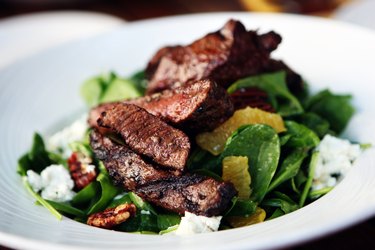
Does it sting when you drink orange juice? Is an area of your mouth tingly? Have you noticed a tender white, gray or red patch on your inner lip or cheek, around your tongue or on the roof of your mouth? Chances are, you've got a canker sore.
"Also known as aphthous ulcers, canker sores are yellow to white membranes that occur in the mouth," says Ali Shazib, DMD, assistant professor of oral medicine at the University of North Carolina Adams School of Dentistry. "They can develop as a result of nutritional deficiencies, systemic conditions — such as GI diseases like celiac and Crohn's — or trauma to the inner mouth."
Video of the Day
Video of the Day
For example, if you bite your inner cheek while chewing, it could morph into a canker sore.
An April 2013 study in Nature points out that stress also contributes to the onset of canker sores.
Although these mouth ulcers are common, that doesn't make them any less annoying.
Is a canker making you cranky? The fastest way to heal it is with an over-the-counter or prescription product (such as a steroid gel or antibacterial mouthwash). Or you can try one of these quick-and-easy home remedies.
1. Honey
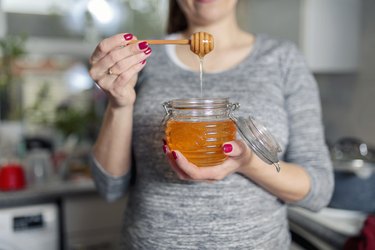
Here's some sweet news: In an August 2014 study in Quintessence International, dabbing honey onto a canker sore reduced pain, size and redness, and shortened healing time by about a day. The effect might be thanks to honey's analgesic and anti-inflammatory properties.
"Some people also find that honey has a soothing effect and improves pain by coating the area," Dr. Shazib says. "Just keep in mind that it is high in sugar." Translation: Don't overdo it, and don't slack on brushing.
How to Use Honey for a Canker Sore
Apply it to the sore four times a day for five days, per the Quintessence International study.
2. Ice
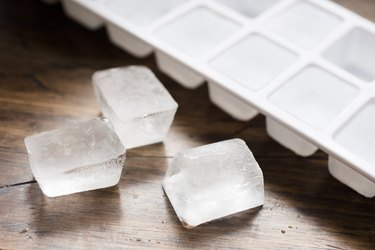
Give those canker sores the deep freeze.
"The cold alleviates pain and reduces inflammation," Dr. Shazib says. "It can bring short-term relief to canker sore discomfort."
How to Use Ice for a Canker Sore
Dr. Shazib recommends letting bits of crushed ice dissolve in your mouth as needed.
3. Aloe Vera
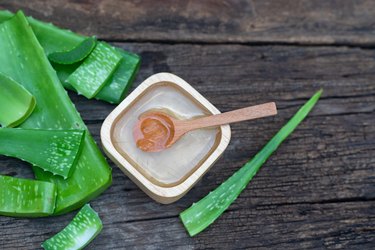
This tropical plant isn't just a natural remedy for sunburn; it can also help if your mouth is on fire.
A small August 2012 study in Dental Research Journal discovered that slathering aloe on a canker sore decreased pain, ulcer size and healing time. Dr. Shazib reports that his patients have also experienced relief with aloe gel. Study researchers suggest it's because aloe has an anti-inflammatory effect and stimulates the immune system.
How to Use Aloe Vera for a Canker Sore
The Dental Research Journal study found that dotting pure aloe vera gel on the sore three times a day for at least 10 days was helpful. Just make sure you're using fresh aloe or a product that's intended for oral use, as there are many formulations that you're only supposed to use on your skin. Avoid eating or drinking for 30 minutes after applying.
4. Diet Changes
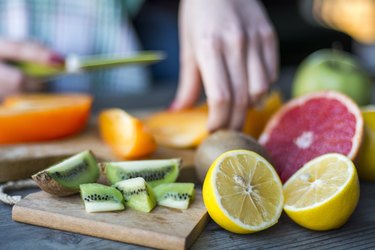
Hold the siracha. Some foods and drinks irritate canker sores, making them more severe and uncomfortable, and slowing down the healing process. "Avoid anything salty, spicy, hot, sharp [like crusty bread] or acidic," Dr. Shazib says.
What's more, your diet might be causing your oral issues in the first place. According to an October 2014 review in Deutsch Arzteblatt International, there is often an association between certain foods and the onset of canker sores. "Canker sores may be the result of a food intolerance or family history of food intolerance," Dr. Shazib says.
How to Use Diet Changes for a Canker Sore
Steer clear of problematic substances until your canker has healed. Per the Deutsch Artzeblatt International study, typical troublemakers include fruit juice; citrus; tomatoes; spices like pepper, paprika and curry; alcohol and carbonated drinks. "Chocolate, pineapple and nuts are also frequent triggers," Dr. Shazib says.
If you have recurring canker sores, become a mouth detective: Pay attention to any potential links between the development of ulcers and what you're eating and drinking.
5. SLS-Free Toothpaste
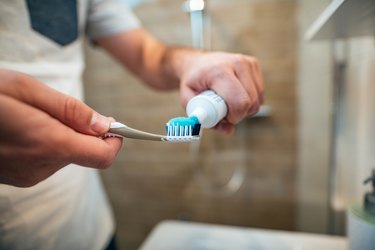
Sodium lauryl sulfate and sodium laureth sulfate (both known as SLS) are compounds commonly found in personal care and home cleaning products, such as body wash, shampoo, laundry detergent, dish soap and — you guessed it — toothpaste.
"SLS is the agent in toothpaste that causes foaming," Dr. Shazib says. It helps the paste spread evenly throughout your mouth to better remove particles of food and bacteria.
But while SLS can help your Colgate get the job done, some people are sensitive to it. As the Deutsch Artzeblatt International study points out, using toothpaste sans SLS significantly decreased canker sore healing time and pain.
How to Use SLS-Free Toothpaste for a Canker Sore
There's currently only one toothpaste without SLS that has been approved by the American Dental Association (ADA): CloSYS Sensitive Fluoride Toothpaste ($9.99, CloSYS.com). Consider switching to this paste whenever you have a canker sore. And if your cankers keep coming back, permanently swapping your regular toothpaste for one that skips SLS might help.
6. Vitamins
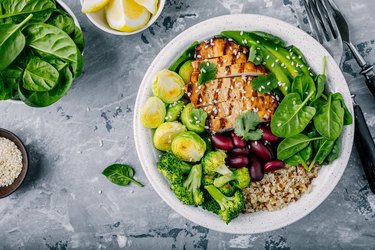
Do you get a steady stream of canker sores? Chew on this: It might be a sign of a vitamin deficiency. A small 2019 study in Oral Health and Preventative Dentistry looked at people with canker sores who were lacking in zinc. After taking a zinc supplement for three months, they reported no new issues.
And zinc isn't the only nutrient that can play a role. A March 2018 study in Medicina Oral, Patologia Oral y Cirugia Bucal discovered that iron and B12 deficiencies may also lead to canker sores. In the study, 21 percent of people assigned female at birth (AFAB) who frequently got canker sores were low in iron, compared to just 6 percent of canker-free people AFAB. Meanwhile, 39 percent of people with canker sores assigned male at birth (AMAB) and 30 percent of those AFAB were lacking in vitamin B12. In the control group, just 11 percent of people AMAB and 16 percent of people AFAB had subpar B12 levels.
"If nutritional deficiencies are causing your canker sores, supplementing your diet with foods rich in those nutrients will both reduce future outbreaks as well as shorten healing time," Dr. Shazib says.
How to Use Vitamins for a Canker Sore
If you have ongoing problems with cankers, the first step is to consult your doctor. "In many cases, recurring canker sores are indicative of an underlying condition or nutritional deficiency," Dr. Shazib says.
In which case you need professional help. If it turns out your diet is a factor, your health care provider might recommend working with a dietitian to get you on track.
In the meantime, try upping your intake of foods high in zinc, B12 and iron. (You'll have better results if you stick to food sources rather than taking a supplement.)
Luckily, there's plenty of overlap in the foods containing these key nutrients. Think: Red meat, poultry, and seafood. For vegetarians? Munch on beans, nuts, whole grains, leafy greens, fortified breakfast cereal and dairy.
7. Milk of Magnesia
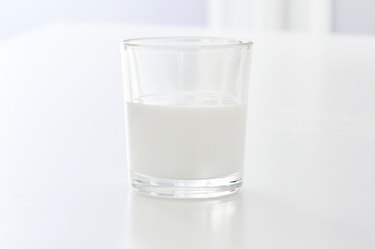
This antacid might soothe a canker sore.
"There is not a lot of evidence behind it, so I haven't recommended it to patients," Dr. Shazib says. "Still, it forms a nice coating on the area that can act like a protective agent."
How to Use Milk of Magnesia for a Canker Sore
Apply liquid milk of magnesia directly to the canker sore using a Q-Tip, or swish it around in your mouth for two to three minutes and then spit it out.
What About Salt?
People claim salt will dry out a canker sore and speed up recovery — and a July 2016 PLOS One study found that rinsing with a saltwater solution improved canker sore healing. Still, Dr. Shazib isn't sold. "Salt will worsen the pain," he says. "A canker sore is essentially an open wound and is very sensitive."
Still want to give it a shot? Instead of applying salt directly to the canker sore (that's pretty much a recipe for torture), whip up a saltwater rinse mouthwash. A 2014 review in the Journal of Pharmaceutical Sciences and Research, suggests dissolving one teaspoon of salt and half a teaspoon of baking soda in one cup of warm water. Swish for 30 seconds, then spit out.
What About Hydrogen Peroxide?
Hydrogen peroxide is better reserved as a household cleaner than a canker sore treatment.
"People may think it will disinfect, but it is not beneficial," Dr. Shazib says. "Because it is acidic, it can burn the oral cavity and make the canker sore worse."
The Healing Stages of a Canker Sore
Typically, your canker sore will disappear in seven to 14 days. "Eighty percent of canker sores are minor ulcers which do not scar and heal within one to two weeks," Dr. Shazib says. "Less than 20 percent of the time they are major ulcers: These are larger than a dime, take four to six weeks to heal and may scar."
Here's what you're looking at with a minor ulcer:
- Day 1: Some people notice symptoms soon after the canker sore's development. For example, if you accidentally bite your inner cheek, you'll immediately feel a wound there. And if you eat a certain food or use a product that triggers it, you could see early signs of a canker coming on. "You might feel a tingly, rough, raw or burning sensation in the area a few hours after exposure," Dr. Shazib says. "You may also have a sore throat, fever and swollen lymph nodes." But some folks have no initial symptoms; they just see a swollen, red, oval-shaped sore in the mouth.
- Days 2-3: The sore turns yellow, gray or white in color. "The yellowish-white color is caused by fibrin, a repair substance created by the body," Dr. Shazib says. "Fibrin forms a membrane that covers the ulcer in order to allow for healing." Fibrin is the same stuff that creates scabs. And when scabs are exposed to moisture, they turn white.
- Days 4-6: The pain should start to lessen as the canker sore heals.
- Days 7-14: The canker sore should clear up completely.
- Journal of Pharmaceutical Sciences and Research : "Various Remedies for Recurrent Aphthous Ulcer- A Review"
- Deutsch Arzteblatt International: "The Treatment of Chronic Recurrent Oral Aphthous Ulcers"
- PLOS ONE: "Rinsing with Saline Promotes Human Gingival Fibroblast Wound Healing In Vitro"
- Quintessence International: "Efficacy of honey in comparison to topical corticosteroid for treatment of recurrent minor aphthous ulceration: A randomized, blind, controlled, parallel, double-center clinical trial"
- Dental Research Journal : "Evaluation of the therapeutic effects of Aloe vera gel on minor recurrent aphthous stomatitis"
- Oral Health Preventative Dentistry: "Recurrent Aphthous Stomatitis as a Result of Zinc Deficiency"
- Medicina Oral, Patologia Oral y Cirugia Bucal: "Hematinic deficiencies in patients with recurrent aphthous stomatitis: variations by gender and age"
- NIH: "Zinc"
- NIH: "Iron"
- NIH: "Vitamin B12"
- Nature: "Stress associated with onset of recurrent aphthous stomatitis"
Is this an emergency? If you are experiencing serious medical symptoms, please see the National Library of Medicine’s list of signs you need emergency medical attention or call 911.